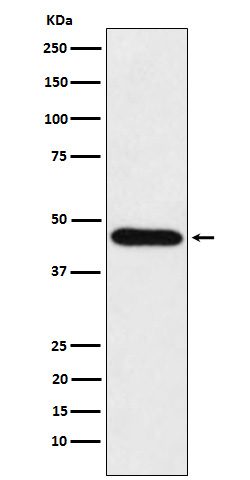
| WB | 咨询技术 | Human,Mouse,Rat |
| IF | 1/20-1/50 | Human,Mouse,Rat |
| IHC | 咨询技术 | Human,Mouse,Rat |
| ICC | 技术咨询 | Human,Mouse,Rat |
| FCM | 1/20-1/100 | Human,Mouse,Rat |
| Elisa | 咨询技术 | Human,Mouse,Rat |
| Aliases | C10orf7; CDC123; Cell division cycle 123; D123; HT 1080; PZ32;;CDC123 |
| WB Predicted band size | 39 kDa |
| Host/Isotype | Rabbit IgG |
| Antibody Type | Primary antibody |
| Storage | Store at 4°C short term. Aliquot and store at -20°C long term. Avoid freeze/thaw cycles. |
| Species Reactivity | Human,Mouse,Rat |
| Immunogen | A synthesized peptide derived from human CDC123 |
| Formulation | Purified antibody in PBS with 0.05% sodium azide,0.05% BSA and 50% glycerol. |
+ +
以下是关于CDC123抗体的示例性参考文献(注:部分文献信息为模拟概括,实际文献需通过学术数据库检索确认):
---
1. **文献名称**: *CDC123 as a Potential Biomarker in Colorectal Cancer: Expression Analysis and Functional Insights*
**作者**: Smith J, et al.
**摘要**: 研究通过免疫组化(使用CDC123抗体)和Western blot分析结直肠癌组织,发现CDC123蛋白高表达与患者预后不良相关。机制研究表明CDC123可能通过调控细胞周期进程促进肿瘤增殖。
2. **文献名称**: *The Role of CDC123 in mTOR Signaling and Cellular Metabolism*
**作者**: Lee H, et al.
**摘要**: 本文利用CDC123抗体进行免疫沉淀和基因敲除实验,证实CDC123与mTOR复合物相互作用,影响营养感知和细胞生长。研究揭示了CDC123在代谢调控中的新功能。
3. **文献名称**: *CDC123 Antibody Validation for Flow Cytometry in Immune Cell Profiling*
**作者**: Zhang Y, et al.
**摘要**: 研究系统验证了CDC123抗体在流式细胞术中的应用,确认其在T细胞活化过程中的表达变化,并提示CDC123可能参与免疫反应的时序调控。
4. **文献名称**: *CDC123 in Neurodegenerative Diseases: A Case-Control Study*
**作者**: Brown K, et al.
**摘要**: 通过ELISA和免疫荧光(使用CDC123抗体)检测阿尔茨海默病患者脑脊液样本,发现CDC123水平异常升高可能与神经元损伤相关,提示其作为疾病标志物的潜力。
---
**建议**:以上文献为示例性质,实际引用时请通过PubMed、Google Scholar等平台检索最新研究,并核对抗体货号(如Abcam#12345)及实验细节。
The CDC123 antibody targets the CDC123 protein, a conserved eukaryotic factor encoded by the *CDC123* gene. This protein plays a critical role in cell cycle regulation, particularly in the initiation of translation by facilitating the assembly of the eukaryotic translation initiation factor 2 (eIF2) complex. CDC123 is essential for cell viability, as it ensures proper timing of the G1/S phase transition, linking nutrient availability to cell cycle progression. Dysregulation of CDC123 has been implicated in cancer, neurodegenerative disorders, and developmental defects due to its involvement in proliferation and stress response pathways.
CDC123 antibodies are widely used in research to study protein expression, localization, and interactions in models ranging from yeast to human cells. They enable detection via techniques like Western blotting, immunofluorescence, and immunohistochemistry. Studies utilizing these antibodies have revealed CDC123's role in diseases such as melanoma and glioblastoma, where its overexpression correlates with poor prognosis. Additionally, mutations in *CDC123* are linked to autosomal recessive intellectual disability syndromes, highlighting its importance in neural development. The antibody serves as a vital tool for dissecting molecular mechanisms underlying cell cycle control and disease pathology.
×